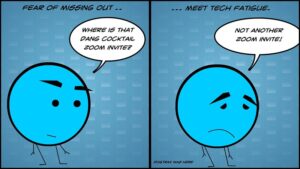 I know, it’s an acronym. Yet a timely one. Do you have “fear of missing out?”
I know, it’s an acronym. Yet a timely one. Do you have “fear of missing out?”
Not me. FOMO is not part of my curmudgeonly life: I almost always see hit movies and TV series years later, don’t watch TV except one hour a week max. I leave my phone silenced, without even a buzz. I don’t give out my phone number, even to my employer. If I don’t know a number in “recents” I block it. I call it my “Love of Missing Out.” LOMO!
So where did FOMO come from? Faith Hill’s article in The Atlantic Monthly (YES, monthly again) gives us her ideas on genesis of our term, “author and speaker Patrick McGinnis coined the term.” I think she needs to say more, as McGinnis explored the idea in the early 2000s and gave it a name, but naming is not always claiming.
The Wikipedia entry and the site cited by Hill note that the “phenomenon was first identified in 1996 by marketing strategist Dr. Dan Herman, who conducted research and published an article in The Journal of Brand Management.” The Wikipedia page compares FOMO to the older “keeping up with the Joneses,” a Postwar phrase.
Hill ends up praising her FOMO tendencies, while admitting:
This is no way to live, you might be thinking. FOMO tends to be described as a dark impulse, something that keeps you from being present as you worry instead about what better option could be around the corner, or scroll miserably through the online evidence of what fun everyone is having without you.
You follow her breadcrumbs to the source, which notes how the fear can be part of anxiety disorder, the most common invisible disability on our campus.
And my students wonder why I call phones “dopamine dispensers.” Dr. Essid’s prescription is an close as your thumbs: ignore celebrities, Doomscrolling, and what comes out of some politicians’ always-open mouths. Ditch binging on TikTok, box scores, and movie trailers. Take out the earbuds and take a walk outside to see real buds already appearing on certain plants.
Build something instead of consuming things. Try some LOMO. You’d find it called JOMO at a Psychology Today article. Lomo can mean “back” in Spanish, though in my experience it meant a cut of meat. So find LOMO by turning your back on FOMO!
Yes, I’m shouting into a hurricane. But I can help a few of you lose that FOMO, part of my life’s work is done. Of course, here I am, seeking eyeballs on a blog and the dopamine hit I get when you tell me that you read it.
Just don’t call me to say so. Harumph. Time to step outside.
If you think of any words or metaphors to share with the community in 2025, send them to me by postcard, telegram, smoke-signal, pony express, signal rocket, at jessid -at- richmond -dot- edu or by leaving a comment below.
See all of our Metaphors of the Month here and Words of the Week here.
WONDERFUL image by Kevin Hodgson at Flickr.









